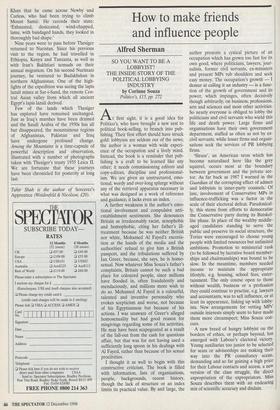How to make friends and influence people
Alfred Sherman
SO YOU WANT TO BE A LOBBYIST? THE INSIDE STORY OF THE POLITICAL LOBBYING INDUSTRY by Corinne Souza Politico's, £15, pp. 272 At first sight, it is a good idea for Politico's, who have brought a new zest to political book-selling, to branch into pub- lishing. Their first effort should have struck gold: lobbyists are seldom out of the news; the author is a woman with wide experi- ence of the occupation and a lively mind. Instead, the book is a reminder that pub- lishing is a craft to be learned like any other; it needs commissioning editors and copy-editors, discipline and professional- ism. We are given an unstructured, emo- tional, wordy and over-long splurge without any of the retrieval apparatus necessary in what was designed as a work of reference and guidance; it lacks even an index.
A further weakness is the author's emo- tional involvement and compulsive anti- establishment sentiments. She denounces Britain as irredeemably racist, xenophobic and homophobic, citing her father's ill- treatment because he was neither British nor white, Mohamed Al Fayed's excoria- tion at the hands of the media and the authorities' refusal to give him a British passport, and the tribulations suffered by Ian Greer, because, she says, he is homo- sexual. Now whatever Miss Souza's father's complaints, Britain cannot be such a bad place for coloured people, since millions have flooded in, often fraudulently and mendaciously, and millions more wish to do so. Mohamed Al Fayed is a colourful, talented and inventive personality who evokes scepticism and worse, not because of his Egyptianness but because of his actions. I was unaware of Greer's alleged homosexuality but had good reason for misgivings regarding some of his activities. He may have been scapegoated as a result of the fall-out from the cash for questions affair, but that was for not having used a sufficiently long spoon in his dealings with Al Fayed, rather than because of his sexual proclivities.
I thought it as well to begin with this constructive criticism. The book is filled with information, lists of organisations, people, backgrounds, recent history, though the lack of structure or an index limits its practical value. By and large, the author presents a cynical picture of an occupation which has grown too fast for its own good, where politicians, lawyers, jour- nalists, former civil servants, ex-ministers and present MPs rub shoulders and seek easy money. The occupation's growth — I demur at calling it an industry — is a func- tion of the growth of government and its power, which impinges, often decisively though arbitrarily, on business, professions, arts and sciences and most other activities. So nearly everyone is obliged to lobby the politicians and civil servants who wield this life and death power. Large firms and organisations have their own government department, staffed as often as not by ex- civil servants, while lesser firms and organi- sations seek the services of PR lobbying firms.
`Sleaze', an American term which has become naturalised here like the grey squirrel, occurs most at the boundary between government and the private sec- tor. As far back as 1987 I warned in the Guardian of the corrupting effect of admen and lobbyists in inner-party counsels. Of late, involvement of Conservative MPs in influence-trafficking was a factor in the scale of their electoral defeat. Paradoxical- ly, this stems from efforts to democratise the Conservative party during its Butskel- lite phase. In place of the wealthy middle- aged candidates standing to serve the public and preserve its social structure, the Tories were encouraged to choose young people with limited resources but unlimited ambitions. Promotion to ministerial rank (to be followed by lucrative board member- ships and chairmanships) was bound to be slow. In the meantime, members needed income to maintain the appropriate lifestyle, e.g. housing, school fees, enter- tainment. The only course open to those without wealth, business or a profession they could continue to practise, e.g. lawyers and accountants, was to sell influence, or at least its appearance, linking up with lobby- ists. New arrangements for vetting MPs' outside interests simply seem to have made them more circumspect; Miss Souza con- curs.
A new breed of hungry lobbyist on the borders of ethics, or perhaps beyond, has emerged with Labour's electoral victory. Young auxiliaries too junior to be selected for seats or advisorships are making their way into the PR consultancy scene, demanding and so far gaining a high price for their Labour contacts and access, a new version of the class struggle, the direct expropriation of the expropriators. Miss Souza describes them with an endearing mix of scientific accuracy and disdain.










































































 Previous page
Previous page